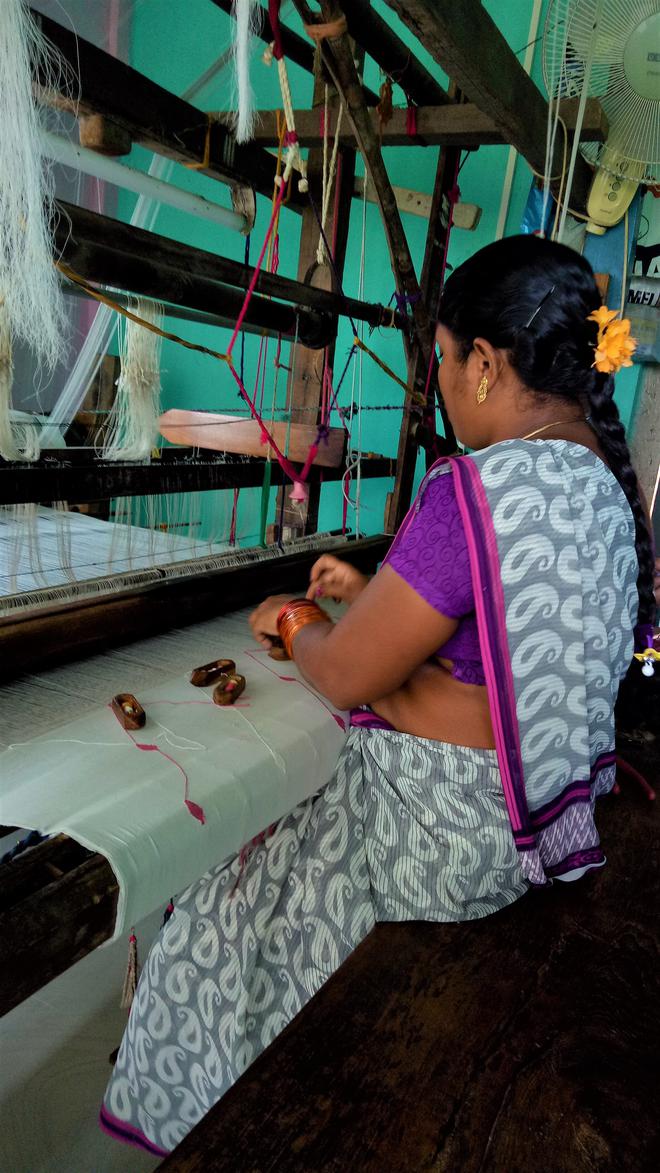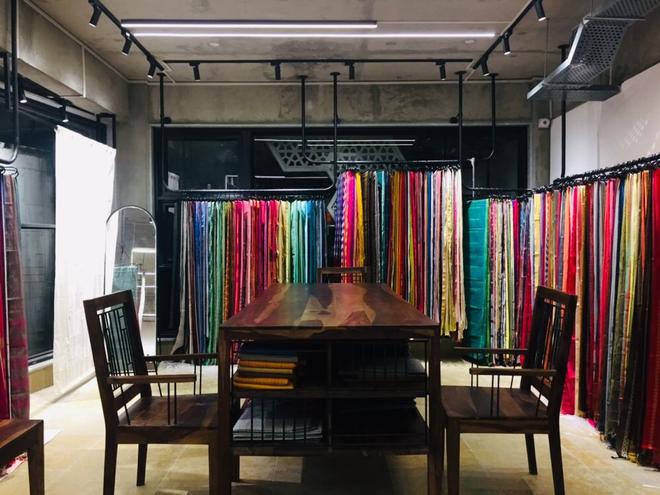Veerabasweswari from East Godavari district and Sandhya from Ponduru, Srikakulam district, are among the women handloom weavers who have travelled to Hyderabad for the inauguration of Creyo, a store at the Crafts Council of Telangana premises CCT Spaces. Creyo will stock saris, fabrics and garments woven by the weaver clusters in East Godavari, Srikakulam and Narayanpet, supported by Chitrika foundation.
The women beam with pride when they spot saris woven by them at the store. “Many of us come from families of weavers. I grew up watching my mother and other women work at the loom and I took to it naturally. Weaving is a way of life for me, my mother and my mother-in-law,” says Sandhya. Her speciality is the kuppadam weave of Srikakulam, which is an interlocking technique to design temple borders in contrasting colours.
The kuppadam of Srikakulam is different from that of East Godavari in which the interlocking technique plays up contrasting colours, often without the temple border.

Both the women mention that some of the saris woven by their clusters were worn by actor Ritu Varma in the Telugu film Varudu Kavalenu. “Some of the Baahubali team members also picked up our saris,” they add.
Chitrika foundation has been working with women weavers in Srikakulam, East Godavari and Narayanpet. The label Chitrika, which until now tapped consumers through their online portal (chitrika.in) and exhibitions hosted by Crafts Council, hopes to widen its reach through the Creyo store. Vijaya Switha Grandhi, who founded the label in 2005, says Creyo will act as an umbrella label that will stock products of Chitrika as well as products from small agriculture and dairy farm units in the near future.
In the last few years, Chitrika has roped in textile designers and fashion graduates to tweak the traditional weaves and make them more appealing to urban buyers. Switha and textile designer Samyuktha Gorrepati, who has been closely associated with the organisation, say that the design interventions have helped expand the colour and design palette while retaining the distinct identity of the native weaves. “For example, checks are common in Narayanpet and East Godavari regions. We retained the checks but gradually got the weavers to experiment with a mix of colours,” says Samyuktha.
Similarly, the traditional zari borders were replaced with borders in a pop of colours. A solid, bright border contrasts the gamcha-like small check pattern in a sari. In another, the checks and stripes are used in some portions of the sari while the woven jamdani butas draw attention to the pleats and pallu.
The Srikakulam ballakammi weave, an extra weft technique used to create textured patterns primarily on the pallu, also went in for a change. Samyuktha shows how that technique has been used in the body of the newer saris to create patterns and textures. The colour palette varies from mauves to magentas, turmeric yellows to aqua blues. A traditional sirigadi or small check Srikakulam shirting clothing design served as an inspiration for a few saris.

Samyuktha explains that an additional challenge is to innovate such that designs cannot be easily replicated on a powerloom. She shows a woven buta motif in three colours and says such patterns are tough to copy on the powerloom: “We need to innovate to stay afloat. Colour fastness has also been our USP. A lot of research goes into choosing the dyes and the washing technique to ensure that the clothes do not bleed.”
Some of the women weavers who join the conversation add that they are ready to take on design challenges. “We can weave four to six saris a month if the design is simple and we have help on the loom. Complex designs take more time, but we earn better and we are happy when the saris get sold and we get more orders,” says Veerabasweswari. The women say that they can earn up to ₹12,000 or ₹15,000 a month for weaving four or five saris.
Creyo stocks handloom saris, fabrics and garments such as dresses, crop tops, trousers and tunics. The price ranges from ₹1,500 to ₹9,000.







